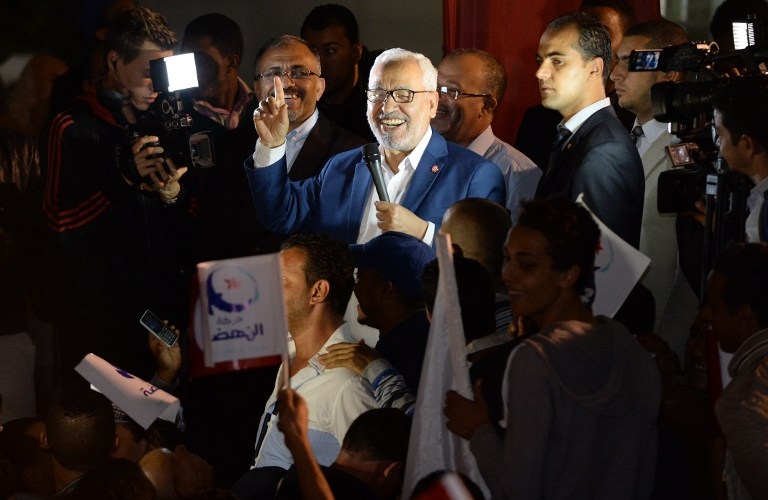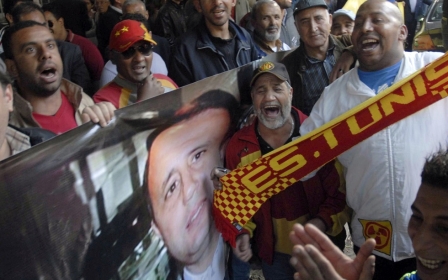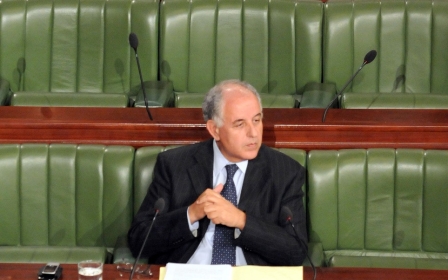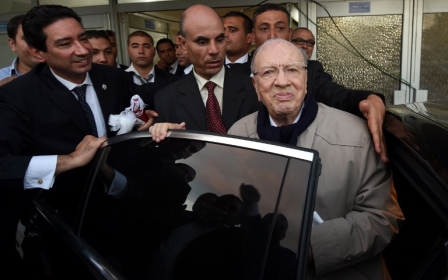Without a candidate, Ennahda faces dilemma as Tunisian elections near

TUNIS - As Tunisians prepare to vote for a president on Sunday, supporters of the popular uprising which overthrew the country’s dictatorship in 2011 are faced with a brutally hard choice.
It is particularly painful for those who champion Ennahda, the Islamist party which won the elections of October 2011 but lost control of the government in parliamentary elections last month.
Before that defeat, Ennahda had decided not to present a candidate for Sunday’s presidential elections. Now they have lost the premiership and have no prospect of the presidency either.
Adding to their supporters’ woes, Ennahda’s executive council last week decided not to endorse any of around two dozen candidates for the presidency.
“We asked the other parties to agree on joint candidates and minimise the total number to three or four. This would allow the elected president to have maximum support,” Ali Laarayedh, Ennahda’s secretary-general, told MEE. “Unfortunately, it wasn’t possible and we now have too many candidates.”
Analysts say Ennahda’s decision not to run for the presidency and tell their supporters the choice is open was only the latest in a long series of concessions over the last three years designed to show there was no risk of a total take-over of power by Islamists. “That’s not completely false,” said Laarayedh, “although the opinion polls were not putting us in the lead for the parliamentary elections at the time we took the decision not to offer a candidate for the presidency. We didn’t want to frighten people. Building respect for democracy takes time. We say we must make the maximum concessions for democracy to continue.”
The 2011 uprisings in Tunisia launched the Arab spring and, after the counter-revolution in Egypt, the chaos of Libya, and the civil war in Syria, it is the only place in the Middle East where the original flame of democratic revolt still flickers in an atmosphere of peaceful debate, largely devoid of violence. But many Tunisians fear the gains of the uprising are coming under threat in an increasingly tense political atmosphere. Rather than having Ennahda in control of both the presidency and parliament, there is a strong chance that Nidaa Tounes, a new and largely anti-Islamist party that is supported by members of the old regime, could soon have hegemony over the country. Its presidential candidate is Beji Caid Essebsi.
Ennahda’s leadership is still trying to work out why they lost more than a third of their 2011 support and ended with 31 percent in last month’s vote compared to Nidaa Tounes’s 39 per cent. “It was economic and social. People had very high expectations after 2011,” Laarayedh said. He pointed out that the two secular parties who governed in coalition with Ennahda fared even worse. The Congress for the Republic, whose leader Moncef Marzouki is the country’s interim president, only won four seats compared to 29 in 2011. Ettakatol, a social democratic party, lost all but one of its 20 seats.
“We weren’t able to run a good campaign, and the media are in general against us,” Laarayedh told MEE. The most popular TV chat shows appear on private channels that fiercely oppose Ennahda. They follow a narrative of Tunisia’s post-uprising years which claims that Ennahda worked closely with the country’s Salafis and have a hidden agenda of wanting to impose sharia law and an Islamic state. The editorial directors of the state TV channels were elected by staff journalists, most of whom are also anti-Ennahda.
Nidaa Tounes supporters say Ennahda turned a blind eye to the Salafi take-over of thousands of mosques in the chaotic days after Ben Ali’s overthrow. Their imams were forced out and replaced by Salafis.
Laarayedh became Minister of the Interior in the Ennahda-led government that took office in December 2011. “When we came to power, a year had passed since Ben Ali left. Why didn’t the previous minister do anything about the mosque take-overs? I took action and, by the time I left the ministry in March 2013 [when he was promoted to Prime Minister], only 200 were left in Salafi hands,” he said.
Fabio Merrone is a longtime Tunis resident and independent local academic who has done extensive research on the Salafis. “Ennahda’s initial position was to say the Salafis are kids who don’t really know Islam, but we won’t go back to the old system of repressing them. But when Abu Iyadh, the head of Ansar al-Sharia, which emerged in 2011, talked of forming a common front with Ennahda, Ennahda didn’t fall into the trap.”
After two secular politicians were assassinated in 2013, the police arrested several Ansar al-Sharia members and said they were implicated. Although no court has yet heard the evidence, Laarayedh, by then Prime Minister, banned Ansar on the grounds it was a terrorist movement.
It was a key moment in Tunisia’s transition to democracy, Merrone argued. It showed Ennahda was committed to non-violence and constitutionality. In his view, the banning of Ansar al-Sharia also explains one of the apparently paradoxical aspects of the violent campaign run by the so-called Islamic state in Iraq and Syria. Around 3,000 young Tunisians have gone to fight in Syria, more than from Saudi Arabia, Jordan or any other Arab country, and most joined ISIS. Many were jobless in Tunisia and lived in tough and poor neighbourhoods. But their lack of prospects and the magnet of foreign adventure are not enough to explain what prompted their exodus, according to Merrone. Seeing Ansar al-Sharia outlawed was the trigger. “If staying in Tunis meant going to prison, they felt they might as well go to Syria,” he said.
Having lost their government leadership in last month’s elections, Ennahda supporters and its top brass are torn over whether to accept a possible invitation to join a government of national unity or reconcile themselves to opposition. Nidaa Tounes says it will wait until the new president is chosen before it forms a government. Ennahda’s grass roots tend to favour abandoning power while the leadership is more willing to support a unity coalition for the sake of stability, the line they have taken for the past three years.
Meherzia Labidi, vice-president of the outgoing parliament, is one of Ennahda’s senior women politicians. In the new parliament, the proportion of Ennahda women has dropped to about a third, or 27 out of the party’s 69 seats. She supports the view that Ennahda should go into opposition, in part so as not to take the blame for the economic problems the next government will face. But she also sees it as a democratic duty. “I’m enthusiastic to be in opposition. People chose us to be in opposition,” she told MEE with a smile. “Now it’s not up to us. The ball is in Nidaa Tounes‘ court. If they invite us into government, we will discuss it in our executive, but my question will be ‘What’s the common programme?’. Entrenching liberty, democratic progress, and guaranteeing the implementation of transitional justice -- there can be no negotiation on this. But what will the government’s economic priorities be.” She made it clear that she thought Ennahda ought not to be bound to another party’s economic programme.
Independent Tunisian analysts, however, argue that there is no clear difference between Ennahda and Nidaa Tounes on economic management. Both parties subscribe to neo-liberal policies imposed on Tunisia, Egypt and other Arab states by the World Bank, the International Monetary Fund and the EU, says Chafik bin Rouine from the Tunisian Observatory on the Economy. Known as the Deauville partnership, the programme which both major parties accept, calls for cuts in government spending on public service workers and tax and other concessions to foreign investors. It was launched in May 2011 at a G8 summit in the French city of Deauville before Tunisia and other Arab countries in post-dictatorship upheaval could launch a calm debate on alternative strategies for economic growth.
Neither Essebsi’s Nidaa Tounes party nor Ennahda have criticised the Deauville partnership, according to bin Rouine. He leads a group of young economists who want a transparent audit of the benefits Tunisia gets from its concessions to foreign investors, including to companies hoping to benefit from Tunisian shale gas obtained by fracking. “Nidaa Tounes and Ennahda are very pragmatic. They follow the recipes of the EU and the international financial institutions exactly,” he told MEE.
The transitional Prime Minister who was in power at the time the Deauville partnership was adopted was Beji Caid Essebsi, today’s front runner in the presidential race. Yet it is the Ennahda party which took office in October 2011 after the country was committed to the Deauville programme’s loans and conditions which was punished in last month’s elections. Alluding to the programme’s failure to reduce youth unemployment and other problems, bin Rouine added: “Essebsi planted several time bombs which exploded in Ennahda’s face.”
Nevertheless Tunisia’s growth rate is respectable by the standards of Britain or the Eurozone. After dropping by 1.9 percent in 2011, the first year of upheaval, it rose by 3.6 percent in 2012 and 2.6 percent last year. But this is not enough to absorb the hundreds of thousands of new entrants to the labour market every year. Huge swaths of young people were turned off politics.
An independent Islamist who did not wish to be quoted said it was not just economic issues that led to the drop in Ennahda’s support in last month’s elections for parliament. “They were seen as weak when they handed over to a technocratic prime minister in January. A few elite voters may have thought it was a good move to show Islamists were not trying to monopolise power. But ordinary people felt ‘We elected them so why did they give up and let us down?’” he said.
This weakness was compounded by “flipflopping”. Ennahda proposed to ban senior people from the RCD, the old regime’s ruling party, from election for ten years, but when the vote came up in parliament they voted against the bill. “There was also a failure to explain their overall strategy. It was a relic of decades in the political underground when they had no public platforms. They have no experience or practice in democratic politics,” he said.
Without a candidate of their own, and with no steer from their leaders, how will Ennahda supporters vote on Sunday? Meherzia Labidi expects “a considerable number will go for Marzouki”. A long-time opponent of the Ben Ali dictatorship but firmly secular, Marzouki was part of the Ennahda-led troika which ran the country between 2011 and today. Some may go for Mustafa bin Jafar, the head of Ettakatol, the third party in the troika.
Marzouki’s camp has held focus groups which show they will get most Ennahda supporters’ votes, though Tarek Kahlaoui, a senior member of Marzouki’s campaign team, told MEE there may be another explanation for Ennahda’s decision not to give its voters a signal. “We asked Ennahda not to endorse Marzouki. We don’t want to be stigmatised as a pro-Ennahda party,” he said.
Middle East Eye propose une couverture et une analyse indépendantes et incomparables du Moyen-Orient, de l’Afrique du Nord et d’autres régions du monde. Pour en savoir plus sur la reprise de ce contenu et les frais qui s’appliquent, veuillez remplir ce formulaire [en anglais]. Pour en savoir plus sur MEE, cliquez ici [en anglais].





